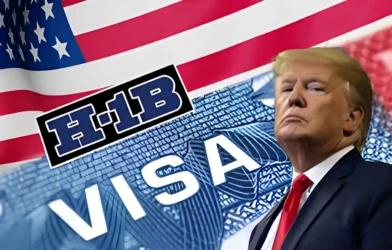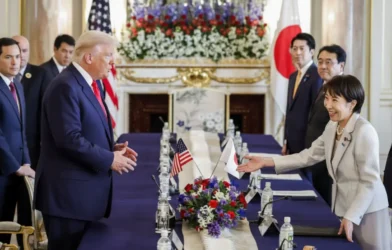Indian IT stocks tumbled sharply on Monday, September 22, 2025, after US President Donald Trump announced a massive hike in H-1B visa application fees to $100,000 per applicant, up from the current $1,000. The move, aimed at curbing immigration and reducing foreign dependence in the US labor market, rattled investors and weighed heavily on the IT sector.
Nifty IT Takes a Hit
The Nifty IT index fell more than 3.5% in intraday trade, compared to a 0.5% drop in the benchmark Nifty. All major IT companies saw their stocks trading deep in the red:
- Tech Mahindra plunged 5.8%, making it the top loser.
- Mphasis and Persistent Systems slipped over 5% each.
- TCS, Wipro, HCL Tech, Infosys, Coforge, and LTIMindtree dropped between 3–5%.
- Oracle Financial Services fell 1.4%.
The sharp correction reflects investor concerns about rising operational costs for IT service providers heavily reliant on US projects.
Implications of the H-1B Visa Fee Hike
According to Motilal Oswal (MOSL), the impact of the new executive order will likely be felt starting FY27, as FY26 visa filings have already been completed. While the structure of the H-1B program remains unchanged, the steep cost increase is expected to influence decisions around on-site staffing and visa filings.
- Reduced Dependence on H-1B: Indian IT companies have gradually reduced reliance on H-1B visas, with only 3–5% of the active workforce typically holding H-1B status.
- Shift Toward Offshore Delivery: Companies are expected to reduce new visa filings and instead focus on offshore delivery and local hiring.
- Profitability Outlook: Offshore work is generally more profitable. MOSL noted that while top-line growth may moderate, operating margins could improve due to higher offshore contribution.
- Legal Challenges Ahead: The order is likely to face legal scrutiny in US courts, which could delay or dilute its eventual implementation.
Big Tech vs. Indian IT Firms
MOSL pointed out that Big Tech companies such as Google, Amazon, Microsoft, and Meta account for a larger share of fresh H-1B applications compared to Indian IT vendors.
Indian firms, with their localization strategies and subcontracting models, are better positioned to adapt. This provides a cushion against the steep fee hike, even though investor sentiment remains fragile.
Brokerage Views on Margins
- JM Financial: Estimated that margin impact from higher local hiring could range between 15–50 basis points. However, in a more likely scenario of higher offshoring, the margin impact could be fully offset, leaving financials neutral.
- MOSL: Suggested that the neutral financial impact makes the current correction more sentiment-driven than structural.
Should Investors Buy IT Stocks Now?
Brokerages maintain that valuations across the IT sector remain reasonable, though a sector-wide re-rating will depend on a fresh technology cycle and earnings upgrades.
- Large-Cap Picks:
- HCL Technologies – valued for its diversified and resilient portfolio.
- Tech Mahindra – backed by improved execution under new leadership and transformation in BFSI.
- Mid-Cap Picks:
- Coforge and Hexaware – expected to perform strongly in cost-conscious markets due to their efficient delivery models.
Analysts recommend selective buying in IT names with strong fundamentals and greater offshore leverage.
Conclusion
The announcement of a $100,000 H-1B visa fee by President Trump triggered a sharp sell-off in Indian IT stocks, reflecting investor fears of increased costs and reduced competitiveness. However, analysts believe the industry’s limited H-1B exposure, localization strategies, and shift to offshore delivery will cushion the long-term impact.
For investors, the correction could present buying opportunities in select IT stocks, particularly those with robust global delivery models and strong balance sheets.
Disclaimer: The views and recommendations expressed in this article are based on analyst and brokerage reports. EQMint does not endorse or provide financial advice. Readers are advised to consult certified experts before making investment decisions.









